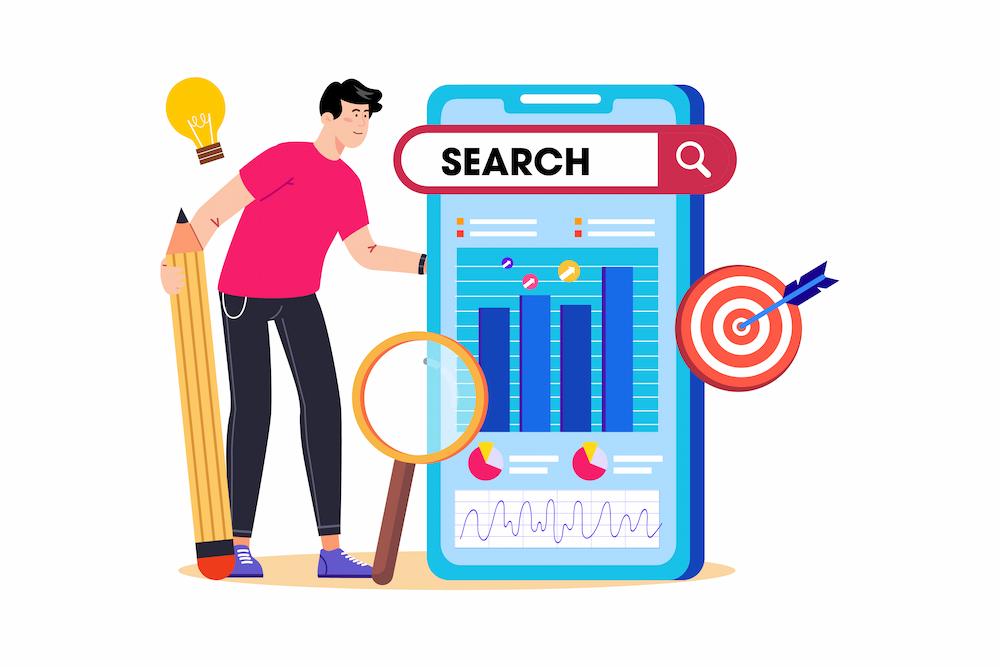When your website isn’t performing well on search engines, it can be frustrating—especially when everything seems fine on the surface. But behind the scenes, hidden issues could be hurting your search engine rankings and visibility.
Common Issues Hurting Your Search Engine Rankings
At NEXTFLY, our Indianapolis digital marketing team specializes in uncovering these unseen problems. We help businesses identify and fix the technical, structural, and content-related flaws that keep them from ranking higher in Google. We’ve listed out the most common issues we see and provided advice on how to fix them.
Content Issues
Content is the foundation of your website’s SEO—but even seemingly minor problems can cause major setbacks.
Thin Content: Pages with very little useful information offer little value to users or search engines. While these pages may have popular keywords in the title, if they have fewer than 100 words, they probably aren’t showing up on the search engine results page.
Duplicate Content: Reusing the same content across multiple pages (or domains) confuses search engines and waters down your keyword authority. It’s not just copy + pasting whole pages; it can be as simple as using the same block of text on multiple pages. Write a couple versions of every page block, or use AI to change things up.
Keyword Cannibalization: When multiple pages target the same keyword, they end up competing with each other—hurting your chances of ranking well. Find opportunities within the page to capitalize on similar keywords. For example, if you have a page called “Carmel, IN Indian Restaurant” where you list all of the dishes at the restaurant, instead of writing “Indian Restaurant in Carmel, IN,” write a new page that highlights a specific dish like “Best Butter Chicken in Carmel, IN.”
 Keyword Stuffing: Overloading pages with the same keyword doesn’t help SEO—it makes your content hard to read and can result in penalties. Be sure to use variations of the keyword throughout your text to better capitalize on showing up in other search results.
Keyword Stuffing: Overloading pages with the same keyword doesn’t help SEO—it makes your content hard to read and can result in penalties. Be sure to use variations of the keyword throughout your text to better capitalize on showing up in other search results.
Hidden Content in Accordions: While accordions can help with user experience, hiding too much keyword-relevant content may limit what search engines can crawl and index. Search engines weigh visible content higher than hidden content.
But who says you can’t have both? One way to remedy accordions hurting your search engine rankings is to expand on these FAQs in blogs or other content pieces and then provide those links in the FAQ accordion. So while you might have an FAQ accordion that asks “What is butter chicken?” Within the answer, you link to a blog that is called “What is utter chicken,” which explains the origins of the dish and what it tastes like. This capitalized on the keyword and helps your linking structure.
Poor Linking Structure
A solid internal and external linking strategy is essential for both user experience and search engine visibility. Having a poor linking structure or no sitemap could be hurting your search engine rankings. Clean, functional linking helps search engines crawl your site more efficiently—and keeps users engaged.
Broken Links: Dead internal or outbound links frustrate users and signal to search engines that your site isn’t well-maintained. Google will also penalize pages with broken links, whether internal or external.
301 Redirects: Failing to set up proper redirects for removed or renamed pages can cause traffic loss and reduce link equity.
Over-Optimized Anchor Text: Using exact-match keywords too often in anchor text can come across as spammy and lead to penalties.
Poor Navigation and URL Structure: If users (and search engines) can’t easily navigate your site or understand your URL structure, you’ll lose out on valuable ranking opportunities.
Accessibility Issues
Search engines prioritize user-friendly websites—and accessibility plays a big role in how your site is ranked. Making your site accessible and secure helps both users and search engines engage with your content more effectively.
Poor Mobile Design: Poor mobile design could be hurting your search engine rankings more than you realize. Since the majority of users now search from their phones, Google uses mobile-first indexing to prioritize mobile performance. If your website isn’t responsive, loads slowly, or provides a frustrating mobile experience, it signals to search engines that your site isn’t user-friendly—causing your rankings to drop.
Missing SSL Certificate: Without HTTPS, Google may flag your site as insecure, which can hurt both SEO and user trust. This can block users from your website entirely.
 Improper Crawl Parameters: If your robots.txt file or meta tags prevent important pages from being crawled, you’re hiding valuable content from search engines.
Improper Crawl Parameters: If your robots.txt file or meta tags prevent important pages from being crawled, you’re hiding valuable content from search engines.
Excessive Use of iFrames: Content inside iFrames is often invisible to search engines, so don’t rely on them for important SEO content.
Slow Load Times: Speed isn’t just about convenience—it’s a key factor in SEO performance. Search engines like Google prioritize user experience, and if your pages take too long to load, Google may push your site down in the rankings in favor of faster, more efficient competitors.
Neglecting Meta Tags
Meta tags may be small, but they play a big role in how search engines understand and rank your site. By optimizing your meta information, you give your pages a better chance to appear—and perform—on search engine results pages.
Missing or Unoptimized Meta Titles and Descriptions: These tags tell search engines—and users—what your page is about. Weak or missing tags can lower click-through rates and rankings. Every web builder has a box to write a meta description; be sure to use it to your advantage. Otherwise, Google will auto-fill your meta description, and it might not be accurate to capitalize on your desired keywords.
Lack of Alt Text on Images: Alt text helps search engines understand your visuals and improves accessibility for users with screen readers. This can help your images appear on Google image searches, too. Alt text is useful, especially when sharing images across social media as well.
Ineffective Link Building
Your website’s content matters, but so does its authority—and lacking that authority could be hurting your search engine rankings. Google determines authority based on how many credible websites link back to yours. While backlinks are one of the strongest ranking signals, low-quality or irrelevant links can do more harm than good. Building the right kind of links is essential for boosting visibility and trust in search results.
Low-Quality Backlinks: Spammy or irrelevant backlinks can harm your SEO more than help it. It’s worth investigating to see who is linking to you. If you find a lot of spammy links, you can disavow them in Google Search Console.
 No Outreach Strategy: Waiting for people to find you won’t cut it. You need to actively build relationships with reputable websites in your industry. Monitor your competitors to see who is linking to them. You can always contact the website and ask them to link to you instead to start building backlinks.
No Outreach Strategy: Waiting for people to find you won’t cut it. You need to actively build relationships with reputable websites in your industry. Monitor your competitors to see who is linking to them. You can always contact the website and ask them to link to you instead to start building backlinks.
Quantity Over Quality: One backlink from a trusted, high-authority site is far more valuable than dozens from sketchy domains. Be aware of people offering to buy backlinks for you. Many of these links are of poor quality. Maintain social media channels and make sure they link to your website properly. Sending out press releases to reputable or local news sites is another way to gain more linking opportunities.
Find Hidden Issues Hurting Your Search Engine Rankings with a Website Audit
If your website is plagued with these issues that are hurting your search engine rankings, it’s not the end of the world. You don’t have to figure all this out on your own.
At NEXTFLY, our team of SEO experts in Indianapolis can perform a comprehensive website audit to uncover technical issues, content gaps, crawl errors, and much more. We’ll deliver a clear, actionable plan to fix problems and boost your search performance.
Don’t let hidden problems stand in the way of your digital growth. Reach out to NEXTFLY today, and let’s start building a stronger SEO foundation for your business.
